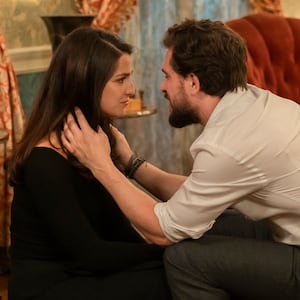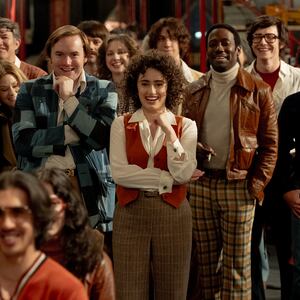The Old Man is only in its second season, and yet sadly, it’s already past its prime.
Despite beginning strongly, Jonathan E. Steinberg and Robert Levine’s FX adaptation of Thomas Perry’s novel began to lose steam toward the end of its initial run, and that deterioration continues at an increased clip during its sophomore outing, which premieres Sept. 12, whose story habitually sidelines its marquee stars Jeff Bridges and John Lithgow in favor of less interesting supporting players and ho-hum conflicts that are a far cry from what the show originally promised. Tangled and turgid, it makes so many miscalculations that it proves a creaky shell of its former self.
Having agreed to team up in order to find their surrogate daughter (Alia Shawkat)—whom one knows as Emily and the other as Angela—former CIA spook Dan Chase (Bridges) and FBI counterintelligence director Harold Harper (Lithgow) sneak into Afghanistan, where the kidnapped Emily (let’s stick with that name for now) has been brought by her biological father Faraz Hamzad (Navid Negahban).
Decades earlier, Dan and Hamzad’s wife Belour (Leem Lubany) fled Afghanistan with Emily, whose real name was Parwana, and now Faraz wants her back. Turns out, however, that once he has her, he does little more than speak cryptically about his pain and sorrow while refusing to pose the questions that she knows he wants to ask. For her part, Emily is stunned by this revelation about her true roots, and almost instantly forms a deep emotional bond with Faraz and her native homeland.

Alia Shawkat and Jacqueline Antaramian
FXMuch of The Old Man’s second episode is dedicated to Emily and Faraz’s tortured dynamic, and it’s a blunder that epitomizes the entirety of this season. Though their reunion should be a time for seeking answers that might assuage their torment, the two instead engage in endlessly cagey conversations, as do Emily and her aunt Khadija (Jacqueline Antaramian), another secondary character who assumes an egregiously outsized role in these proceedings.
With an alacrity that borders on the ludicrous, Emily develops a bedrock attachment to Faraz and his people, whom she views as her own—including her cousin’s adolescent son Farouk, whom Emily embraces as something akin to her own surrogate child. Consequently, she doesn’t hesitate to take a stand to defend them when it becomes clear they’re under grave threat from the Taliban, whom Faraz opposes and who are intensely interested in (and displeased by) the fact that he’s now in possession of a female FBI agent.
The Taliban wants to know about Faraz’s mystery captive, since it believes she might be the key to weakening Faraz, who’s protected from their authority thanks to his control of a lithium mine that’s valuable to the United States. These larger geopolitical issues are frequently at the forefront of The Old Man, and put a halt to its dramatic momentum. No matter that she’s long sought to learn about her late mother (and the place she came from), Emily’s out-of-the-blue feelings of kinship with Faraz and Afghanistan come across as a preposterous device, and that impression grows stronger as she makes risky choices to protect them at the cost of her own safety. More fundamentally, though, the series’ fixation on Afghanistan politics means that it’s no longer really a story about an aged lone wolf on the run from his past—a gravely underwhelming transition.
This is not to say that Dan and Harold aren’t present in The Old Man; rather, it’s that they’re confined to the periphery for prolonged stretches, asked to fret and bicker and, when circumstances demand it, to leap into action. Bridges and Lithgow’s chemistry is as strong as before, but it’s squandered by this chapter of the tale, the two asked mainly to chat about Emily’s fractured identity and their own shifting roles as dads. Their overseas mission is one about escape, reinvention, and self-definition, as they—and Emily’s third dad Faraz—struggle to figure out who they are, where home is, and what their family looks like in this new post-truth reality. Hearing them grouch about such matters, however, is far less exciting than watching them get down to the butt-kicking espionage business that was the show’s early stock and trade, and is mostly forgotten about by this season.
Compounding matters, The Old Man is driven by writerly dialogue that strains for sage profundity. Every other line sounds like it was polished before coming out of someone’s mouth, and the effect is to turn the material ponderous. Devoid of the chase-narrative structure that guided its maiden seven episodes, the series shuffles about at a lackadaisical pace that, however fitting given the age of its protagonists, saps it of urgency. The few times Bridges gets to show off his lethal skills in one-on-one combat, he demonstrates that he's still capable (and convincing) as a terrifying badass who was once known as “baba-khorkhore” (i.e. the beast who ate everything). It’s thus frustrating that those instances are few and far between, and fleet and unsatisfying even when they do materialize. Advertising be damned, he’s largely along for the ride this time around.

Artur Zai Barrera, Jeff Bridges, and John Lithgow
Bryan Cohen/FXLithgow is given even less to do, and if that isn’t a big enough mistake (and it is!), The Old Man primarily spins its wheels in its return engagement, spending entire episodes taking baby steps forward. By its midway point, the series brings back a couple of season-one veterans who are vital to its ongoing concerns. Yet their appearances don’t reverse this drama’s flagging energy. Prioritizing pretentious speechifying to an unreasonable degree, the show loses track of its best qualities and elements. While its concluding three installments weren’t provided in advance to press, it’s difficult to imagine an immediate course correction that would rectify its mounting shortcomings.
Nonetheless, any remedy would invariably start with once again spotlighting Bridges and Lithgow, two preeminent stars whose presence is the main draw of this entire affair. They’re more than capable of shouldering The Old Man’s load; why they aren’t asked to do so in its second season is a mystery of epic proportions.









